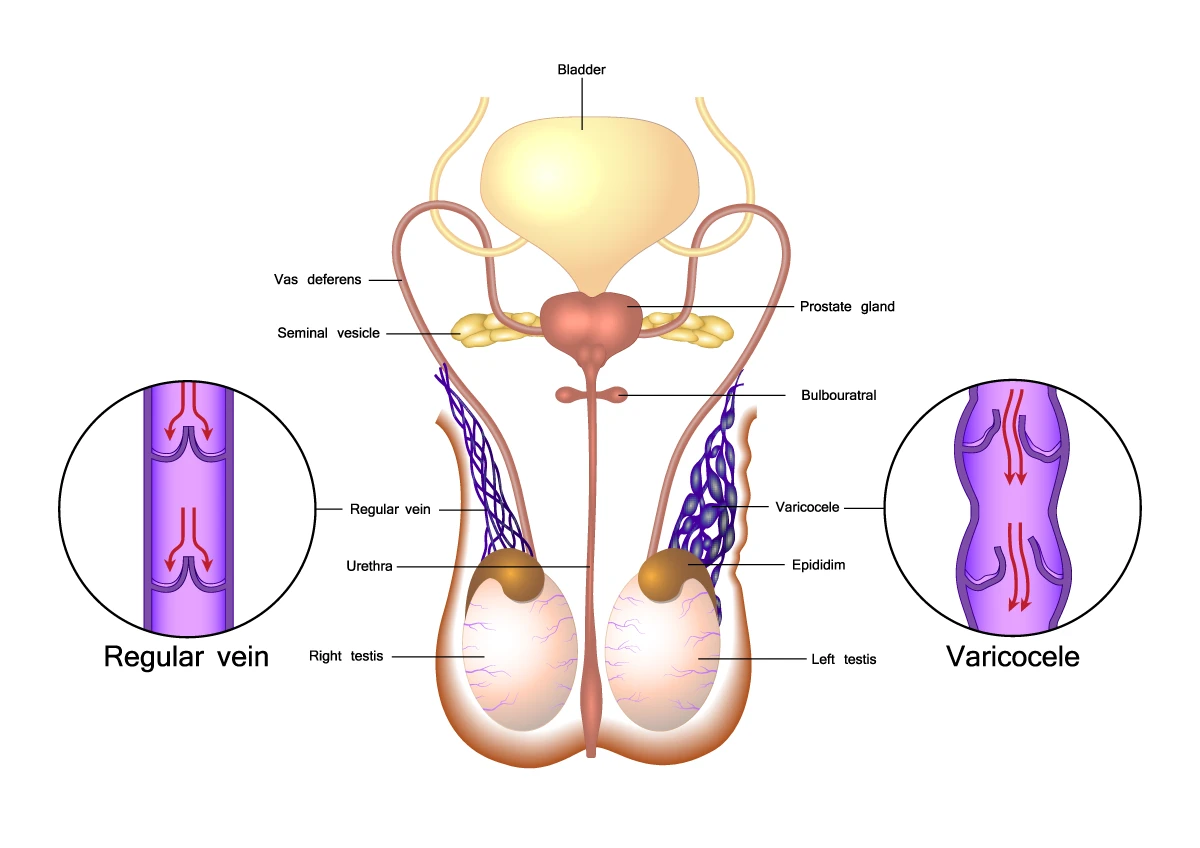Varicoceles
Conversations about men's reproductive health aren't always easy. At Advocate Health Care, our dedicated team of expert urologists addresses this uncomfortable topic with compassion and empathy.
We listen and provide the necessary care for various male reproductive concerns such as erectile dysfunction, infertility and varicoceles.

What is a varicocele?
A varicocele is a condition characterized by the swelling of veins in the scrotum, the pouch of skin that protects the testicles. It commonly develops due to malfunctioning valves within the veins of the spermatic cord, leading to blood accumulation and vein enlargement — like varicose veins in the legs.
Usually, varicoceles cause mild symptoms like swelling of the scrotum and testicular pain, though you might not experience any noticeable signs. In cases where a varicocele causes considerable discomfort or impacts fertility, seeking medical treatment might be advisable.
Varicocele risk factors
Varicoceles are common in males and people assigned male at birth. About one in five men are affected by varicoceles.
While the exact cause of varicoceles is unknown, several factors are believed to contribute to varicocele development, including:
- Hormonal changes
- Lack of physical activity
- Defective valves in scrotum
- Genetics
You are more likely to be affected by varicoceles in the left side of your scrotum than the right or both sides.
Although less common, varicoceles can also be caused by tumors, kidney disease or injuries that disrupt blood flow in the scrotum.
Varicocele symptoms
Many people never show any symptoms of varicoceles, especially in mild cases. Because they can be asymptomatic, most people aren’t aware they have varicoceles until a doctor discovers them during a physical exam.
However, when varicocele symptoms do occur, they might include:
- A visible swelling or lump in the scrotum
- Aching or throbbing in the scrotum
- Infertility
- Discomfort or dull pain
If you suspect you have a varicocele or are experiencing any symptoms in the scrotum, contact your provider to schedule an appointment.
Getting a varicocele diagnosis
The varicocele diagnosis process involves a combination of a physical exam, medical history review and a review of your symptoms.
During the physical exam, your doctor may perform an exam of your scrotum and ask you to perform a Valsalva maneuver, which is where you stand up, take a deep breath, hold your nose and mouth closed and strain to push air out.
Your provider may also order other tests to accurately diagnose varicoceles, including:
- Blood tests: A blood test is used to check hormone levels.
- Digital imaging: An ultrasound provides a visual of the veins in the testicles and is the most common test used to diagnose varicoceles.
- Semen analysis: A semen analysis is used to check the health of the sperm and to see if a varicocele is causing infertility.
Grades of a varicocele
Your doctor will use a grading system to describe the severity and size of varicoceles.
- Grade 0: A varicocele is visible on an ultrasound, but not physically detectable.
- Grade I: A varicocele can be felt on the scrotum when performing a Valsalva maneuver.
- Grade II: A varicocele can be felt without using a Valsalva maneuver.
- Grade III: The varicocele is clearly visible and can be felt.
Varicocele treatment options
Varicocele treatment is recommended based on the severity (grade) of your varicocele. For less severe varicoceles, your provider may not recommend any treatment or suggest at-home care such as using ice packs, making lifestyle changes or taking over-the-counter medications such as ibuprofen for pain relief from varicoceles.
If your varicoceles are severe, your doctor may recommend a varicocelectomy, a surgical procedure to redirect blood flow to healthy veins in the scrotum.
Complications of varicoceles
Most varicoceles go away with proper treatment. However, larger varicoceles may cause complications such as low testosterone and infertility. Low testosterone may shrink the size of the testicles, reduce sex drive, cause depression and decrease muscle mass.
Get care
We help you live well. And we’re here for you in person and online.
